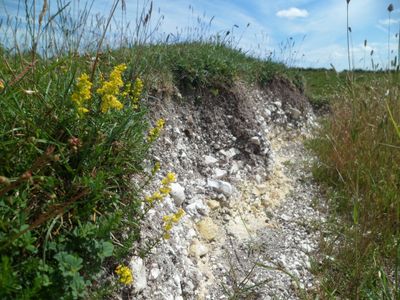What is Chalky Soil?
Chalky soil is comprised mostly of calcium carbonate from sediment that has built up over time. It is usually shallow, stony, and dries out quickly. This soil is alkaline with pH levels between 7.1 and 10. In areas with large deposits of chalk, well water will be hard water. An easy way to check your soil for chalk is to put a small amount of the soil in question in vinegar, if it froths it is high in calcium carbonate and chalky. Chalky soils can cause nutrient deficiencies in plants. Iron and manganese specifically get locked up in chalky soil. Symptoms of nutrient deficiencies are yellowing leaves and irregular or stunted growth. Chalky soils can be very dry for plants in the summer. Unless you plan to amend the soil, you may have to stick with drought tolerant, alkaline loving plants. Younger, smaller plants also have an easier time establishing in chalky soil than larger, mature plants.
How to Fix Chalky Soil in Gardens
When you have chalky soil, you can just accept it and plant alkaline tolerant plants or you can amend the soil. You will still have to take some extra measures to get alkaline loving plants to survive with drainage issues from chalky soil. Adding mulch around the plant crowns can help retain moisture, extra watering may also be required. Chalky soils are sometimes easy to identify by how they rarely flood or puddle; water just runs right through. This can be hard for new plants trying to get established. Improving chalky soil can be done by tilling in lots of organic material like composted pine needles, leaf mold, manure, humus, compost, and/or peat moss. You can also pre-plant a cover crop of beans, clover, vetch, or bitter blue lupine to correct chalky soil. Extra iron and manganese can be provided to plants with fertilizers.
